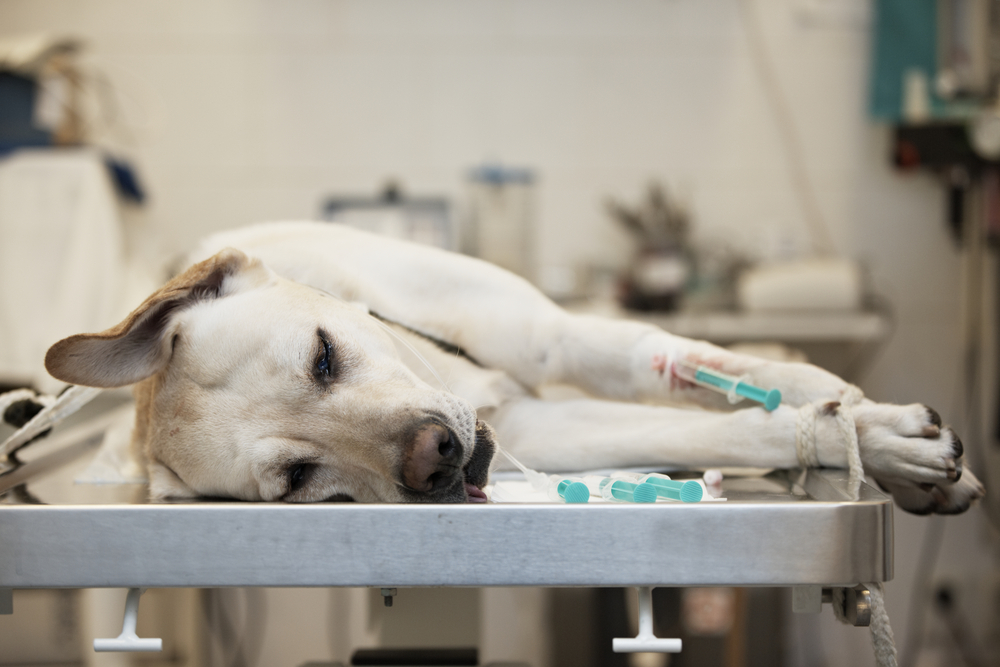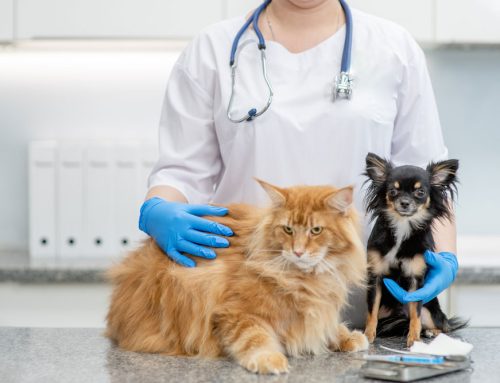Your pet’s immune system protects their body from illness and foreign invaders, such as bacteria or viruses. During some hypersensitivity reactions, your pet’s immune system overreacts to a foreign substance, causing a cascade of inflammation that leads to allergy signs. Delayed hypersensitivity often causes chronic skin or stomach problems, but an acute reaction can have severe consequences. Read our Sixes Animal Hospital at BridgeMill team’s guide to why pets’ allergic reactions occur and what to do if your furry pal experiences an immune system overreaction.
What causes acute allergic reactions in pets?
An acute allergic reaction is a type I hypersensitivity reaction, which occurs minutes or hours after contact with an allergy trigger (i.e., allergen). After your pet’s immune system detects a foreign substance and releases inflammatory mediators, including histamines, they act directly on cells and tissues, and cause allergic reaction signs.
In most cases, a pet does not react to an allergen the first time they encounter it. Your pet must encounter a potential allergen multiple times to sensitize their immune system to respond more quickly and intensely with each exposure. Any substance can cause a pet’s acute allergic reaction, but triggers are similar to those humans experience. Common culprits include insect bites or stings, medications, vaccine antigens, inhaled substances, and rarely food.
The allergic reaction severity spectrum in pets
A type I hypersensitivity reaction can range in severity from mild to severe. Generally, a reaction can be one of two types: urticarial (i.e., hives) or anaphylaxis. The vast majority of pets experience an urticarial reaction, which presents with itchy hives all over the body, facial swelling, and sometimes vomiting or diarrhea.
Anaphylaxis is more severe than an urticarial reaction, leading to shock or death if not treated quickly. During anaphylaxis, blood vessels dilate, and liver damage occurs rapidly, which causes blood to pool rather than to circulate normally. Typical anaphylactic signs include those of an urticarial reaction, plus a sudden, severe onset of diarrhea, vomiting, weakness, breathing difficulty, or collapse.
Acute allergy diagnosis and treatment in pets
Because most allergic reactions present with hives and facial swelling, our Sixes Animal Hospital at BridgeMill team diagnoses most cases based on our physical examination findings alone. If your pet has a more severe presentation, we may perform blood tests or imaging to confirm the problem and develop a baseline understanding of current organ function to help guide your furry pal’s treatment.
We often treat mild to moderate reactions on an outpatient basis, prescribing antihistamines and steroid anti-inflammatories. Pets presenting with anaphylaxis require intensive, immediate veterinary care to restore normal blood flow, blood pressure, breathing, and organ function. In addition to antihistamines and steroids, anaphylactic pets often need epinephrine, intravenous (IV) fluids, supplemental oxygen, a breathing tube, and additional supportive medications. Affected pets are often hospitalized for a few days after the event for observation in case they develop delayed or prolonged issues.

What to do if your pet has an allergic reaction
Most pets’ reactions are mild, but you should seek urgent veterinary care the same day to relieve their discomfort and ensure their condition does not worsen. Our Sixes Animal Hospital at BridgeMill team can address your pet’s urgent and emergency needs during our normal business hours. Simply call ahead to let us know you are on your way to our office. If your pet is experiencing a mild allergic reaction, we may be able to recommend an at-home antihistamine dosage that will do the trick. If the reaction occurs when we are closed, take your pet to a nearby urgent care or emergency veterinary center. Anaphylaxis is an urgent matter, and if you suspect your pet is having an anaphylactic reaction, immediately bring them to your nearest fully equipped emergency veterinary hospital. Ensure you call ahead or while en route so the emergency hospital team can prepare for your pet’s arrival.
Prevention and management for pets with frequent allergic reactions
Allergic reactions are few and far between for most pets, especially those whose triggers are easy to avoid, such as insect stings. However, pets with multiple allergies usually develop a more chronic, delayed response that leads to itchy skin or ear infections, but a few pets may also develop frequent acute reactions. In this case, we may recommend allergy testing and desensitization protocols, or refer your pet to a veterinary dermatologist to reduce your furry pal’s reaction frequency and formulate an emergency response plan you can implement at home.
Immune system disorders, including allergies and allergic reactions, can threaten a pet’s life or their long-term wellbeing. Our Sixes Animal Hospital at BridgeMill team can diagnose and treat your pet’s acute or chronic allergies. Contact us for immediate assistance if your pet is experiencing an allergic reaction or to schedule a consultation regarding long-term allergy management.






Leave A Comment